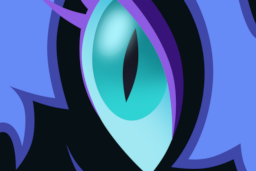
And the First Raising of the Sun
A long time ago, on a late summer morning, two fillies, two sisters, very young, climbed out of the treehouse where they lived alone together, carrying a small wooden bucket. It was so long ago that the two fillies did not yet have names, so long ago that their destinies were still theirs to choose, that they had no quarrels greater than what to eat for lunch or who would have the pleasure and responsibility of carrying the bucket (this went to the older sister, by right of force), that they had only ever met three other ponies besides themselves, and each of those ponies was dead.
Their tree stood upon a tall hill. Their tree’s branches, thick, gnarled, old, reached high into the cloudless, empty blue sky, much higher than any trees that stand today. The two fillies stood on the ground around the tree, where tufts of wild, sharp stalks of grass tickled their chests. The sun shone high overhead, moving of its own accord, stiflingly hot and so intensely bright that even under the shade of their great tree the two sisters had to cover their eyes with their hooves as they looked about the hill. Near the sun, also in the sky, the moon shone with reflected light in nearly equal measure. The two fillies spoke often amongst themselves of their dislike of the untamed and disorderly heavens. Luna in particular complained about the burning sun.
From their hill, they saw a nearby forest. The forest’s trees grew close together and those trees' leaves were a dense, deep green. The two sisters walked down the hill and towards forest. Sweat slipped down their faces and legs. Their damp manes clung to their necks and withers. They fluttered their wings to fan themselves as they walked. The older sister, who would one day be named Celestia by those who carried her banner, strode forward quickly and with purpose, never veering from her path. The younger sister, who would one day name herself Luna, veered from her path often, mostly to stomp on any copses of flowers she found. Luna stood shorter than her older sister, and the tall grass hit her in the face when she walked. The only way to move comfortably or with any speed at all was to walk in the trail left by her sister. Stomping the flowers, which were shorter and weaker than herself, into mangled, broken stems made this situation more bearable. Celestia ignored her younger sister’s childish antics and watched for glimpses of prowling animals between the swaying grass. She saw none.
When they reached the edge of the forest, where the tall grass grew sparsely for lack of sunlight, Luna sprinted ahead and stuck her tongue out at Celestia as she passed her.
Celestia did not respond, did not smile, did not quicken her pace, did not give chase, only continued striding forward. She had already acquiesced in bringing her younger sister to the creek, an unnecessary risk. She would not consent to being made a fool of in the process.
Luna slowed down and let her sister overtake her. Games weren’t any fun if only one pony played along.
They went deeper in the dark, cramped, choked forest, where no grass grew on the ground and little light broke through the foliage overhead. The trees grew wide and tall, not as tall as their tree, but far too tall to climb, so tall that Luna could only see their tops if she craned her neck all the way back. Celestia had told her once that their parents had gone somewhere up in the trees and gotten stuck and couldn’t come back down, but were always close and watching. Luna didn’t believe her. The tops of the trees were too far away for her or her sister’s small wings to reach, so how could Celestia know? Luna didn’t remember their parents. She doubted if they had ever lived at all. She suspected that she and Celestia had been born somehow out of the trees and the grass and the dirt—or perhaps not. It did not matter. She had Celestia, and Celestia had her, and that was the way it was. They needed no one else. She needed no one else. She stopped looking at the treetops.
She saw nothing on the ground but thick roots rising out of compact dirt and the occasional wide-leafed shrub. Sounds of fluttering wings and the repetitive shrieks of bird calls drifted down from above, but Luna never saw any birds. She heard the rustle of leaves and pitter-patter of paws nearby sometimes, but she never saw any animals, either. She thought the animals seemed to purposefully avoid them. Probably because they didn’t like her sister.
Celestia knew why the animals avoided them. Animals avoided them because she had cast a ward to keep them at bay, to keep her and her sister safe from chipped fangs and blood-stained claws.
After a long stretch of walking, Luna heard the trickle and splash of the creek. A little stretch of walking after that, she saw the creek. She grinned and ran towards it.
The creek’s water was murky brown and ran slowly so it got caught in still pools where a black-green film of algae grew over its surface that smelled the way tomatoes smelled after being left on the table so long that they sagged and turned white instead of red. But even in the shaded forest, the air was hot, and the water was cool, so Luna leaped in. The water’s surface barely reached her knees.
Beneath the water, her hooves pressed into cold mud and pebbles. She kicked over a fist-sized, slimy rock. It splashed. A little bit of slender black darted in its place. It jumped. Luna jumped. Luna punched into the water. Her hoof grabbed something soft and wet. She lifted her hoof and looked, but all she had was mud.
Celestia walked into the water slowly, gracefully, still carrying the bucket. She kicked over a rock and dug her hoof into the mud. Celestia was older and smarter so when she brought up her hoof she held a little, black lizard. with slender legs the size of twigs, a long, limp tail, and slippery, mottled skin—a salamander. It crawled swiftly over her hoof. She brought her hoof over the bucket and tipped it over. The salamander fell into the bucket with a muted thump. It tried to climb up the bucket’s sides, but they were too steep.
Celestia smiled at Luna.
Luna scowled back.
They went about catching more salamanders. Luna kept edging away from Celestia so she wouldn’t have to be near her and watch her smugly, condescendingly catch the salamanders that she could not. Celestia stayed near Luna so her younger sister would not get lost. She offered Luna encouraging words when she failed and small praises when she succeeded, but inwardly felt pleased about her own superior skill.
Luna did not catch as many salamanders as Celestia. After a time, she stopped trying to catch them and instead stomped on any salamanders she saw, so at least Celestia wouldn’t get them either. Their small bodies collapsed easily beneath her hooves, and the mud turned a deep red.
Celestia did not notice, too concentrated on her dual task of catching salamanders and keeping an eye out for danger.
By afternoon, dozens of salamanders crawled and slithered under and over each other in a thick, slippery mass in the bucket, and Luna was sticky all over with sweat and algae and blood. Tired and hot, they walked back up out of the woods and then through the field of tall grasses. The sun and moon lingered high in the sky and seemed to glower fiercely down at Luna and Celestia. The temperature had risen and not even fluttering their wings could keep them cool now. They walked slowly, their mouths open, breaths shallow.
They reached their hill and then climbed it and went under the shade of their tree. Celestia laid the bucket down in the grass, in the sun’s burning glare, and covered its top with a large rock.
Celestia and Luna went inside to take a nap.
They forgot about the bucket and the salamanders and the next day they went out and found it and lifted up the rock and inside instead of salamanders they found a thick sludge the same dusky color and egg yolk smell as the salamanders had been.
The salamanders had melted. For hours, they had desperately slithered over each other, climbed up each other’s wet bodies, and jumped at the bucket's sides and then fallen back down. They had run feverishly, sickly along the sides of the bucket as their thin skins dripped away in the sun’s heat, and then they had stopped moving, and then, their skin gone, their slick off-color viscera had leaked out of their chests and their heads into a horrible broth in which they drowned and ceased breathing.
Luna poured out the cup’s contents out into the grass and found something else to play with instead.
Celestia sat contemplating the spilled salamanders for a long time, wondering at the sun’s terrible power and fury, tears trickling down her face. When her meditation was complete, she glared up at the sun, and her wings flared, and her horn shone with an ethereal light.
The sun moved.
Luna watched and hated her sister and desperately dug a deep, coarse hole in the dirt with trembling hooves, and her eyes were wet, and she knew everything had changed and that her parents were not close and were not watching, and that she didn't need anyone. Not even her sister.






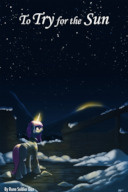
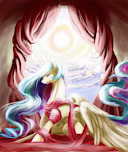

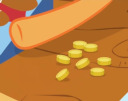
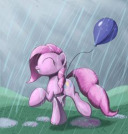
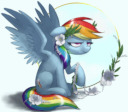
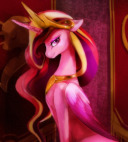




Cute in a weird way. A nice little one shot to get me through class.
I'm...not sure how I feel about this. Seriously. I just...
Wow.
I take it you aren't on Team Luna.
I know the kind of story you're going for, the literary epiphany story. I think this is very close, and written very well, but the story doesn't set up for the ending line that it arrives at. Luna now hates her sister (well, she thinks she does)--but we don't know how she felt about Celestia before. Her parents were not close and were not watching--but she'd already decided she didn't believe she had parents. She didn't need anyone--but Luna didn't think about needing Celestia before. She thought that they didn't need anyone else, but not why or whether she needed Celestia. So you've got a big epiphany at the end, but it doesn't change anything as far as we know.
There's 2 incidents of salamander-killing instead of 1, which seems odd, or at least inefficient. It seems like killing salamanders out of spite would be the kind of thing she'd do after her epiphany rather than before it; this way, it just makes it seem like nothing's changed. I don't understand why she'd be that kind of pony in the first place. It isn't something that most little kids do.
I'd probably cut "everything had changed". It doesn't add anything, and weakens the rest of the sentence.
Usually this type of story doesn't switch viewpoints. I'm not saying it shouldn't; just that I haven't seen it done.
Hmm.
That last paragraph. Just, wow.
... Dark.
I wrote a review of this story. It can be found here.
Why did they catch the salamanders? And why did they not bring them in where it was cool? If Luna had wanted to play with salamanders so much I don't understand why she was more interested in killing them.
Otherwise, haunting. I like it.
Well someone would take a shining to Cormac McCarthy's Outer Dark and he overloaded the hoofbiting action
Disappointing